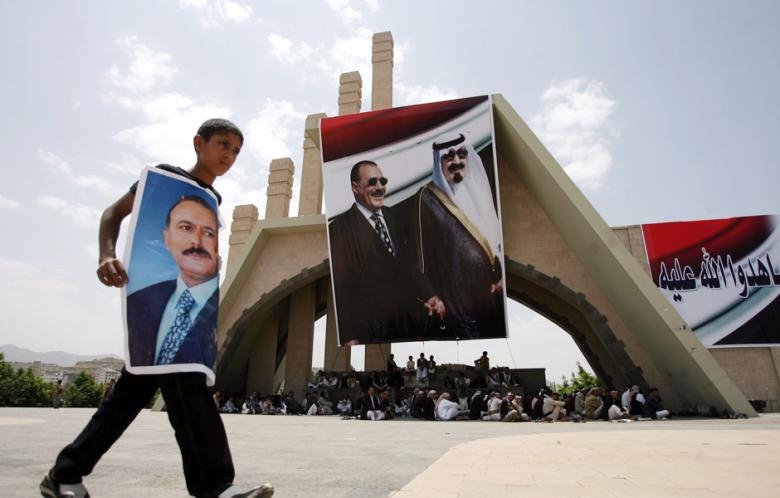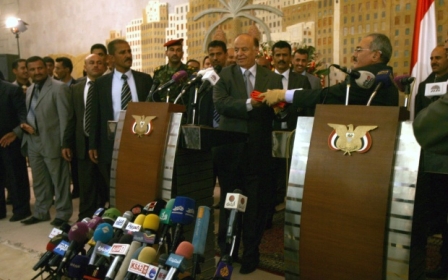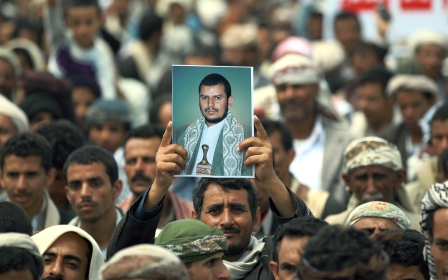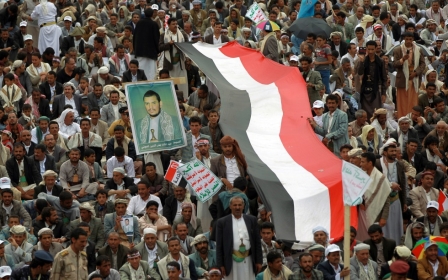ANALYSIS: The deal that broke Yemen

For decades, portraits of Ali Abdullah Saleh – clinging to the walls of libraries, mosques, coffee shops, courtyards and cafeterias – were part of the scenery in Sana’a, Yemen’s dusty capital. In early March 2012 however, the autocrat’s moustachioed image slowly began to disappear, hastily plastered over with glossy mug shots of a bald, solemn-looking man and a slogan reading: "Together we will build a new Yemen."
The new face in town was Abd Rabu Monsour Hadi, a 66-year-old Yemeni politician who, until he replaced Saleh as president in 2012, was someone most Yemenis knew little about. When Hadi came to power on 27 February, 2012 there was excitement in Yemen. After months of mass protests, and for the first time in 33 years, the country had a new head of state. Some saw it as an historic occasion; a chance to put a dark chapter behind them and take steps toward democracy.
But there was also scepticism. Hadi, a quiet and unassuming former army general, who for years served as Saleh’s deputy, seemed to have been chosen primarily for his inoffensiveness (a decade’s worth of ribbon-snipping and dutiful photo-ops on Saleh’s behalf earned him the nickname "Mrs. Saleh". Others called him the "statue" of Yemeni politics, never noticed but always present). Forced to operate for so long in Saleh's shadow, many doubted whether Hadi possessed the political clout to break free from the influence of his former boss.
A fractured, impoverished nation
With the army divided, and tens of thousands of protesters still camped out in cities plagued by blackouts and water shortages, Hadi was ruling a fractured and impoverished nation. A political lightweight had taken on arguably the toughest job in the world.
The GCC deal, engineered by the UN and backed by America and Saudi Arabia, which levered Saleh out of power in 2012 looked fairly good on paper. A six-month national dialogue conference brought together the many groups – tribespeople, Islamists, women, akhdam (a caste of hereditary serfs) – who had toppled Saleh, to try and help them settle their differences and plan for what Yemen, without a dictator, might look like. The aim was to forge a new social contract, draft a constitution, and prepare for free and fair elections in 2014.
But the agreement contained vital flaws; Rather than imprisoning or sanctioning the former president and his family, Saleh walked away scot-free, receiving immunity from prosecution and retaining his position as head of the GPC ruling party. The grievances that drove millions of Yemenis out onto the streets in 2011; unemployment, corruption, lack of political representation, were discussed in the national dialogue conference but little was done to alleviate them. Separatists in the south, who had for years complained of marginalisation, were told federalism was a possibility. Houthi rebels in the north, who battled government forces in a brutal civil war that saw hundreds of thousands of their Zaydi Shiite followers displaced, were offered similarly tepid assurances about “future participation.” Yemen, the logic went, would muddle through.
The resignation of president Hadi, the prime minister and his entire cabinet on Thursday evening - days after Houthi rebels seized control of the presidential palace in Sana’a - has laid bare the failures of the GCC deal. That Saleh has now called for early elections, declared his support for and aided the Houthis (according to phone calls leaked yesterday by Al-Jazeera) adds an ironic and bitter twist to the story of a country that has been in slow-motion collapse for years now.
Whether the GCC pact, which turned out to be a simple reshuffling of the political deck, was doomed from the start can be debated. What is clear is that the “Yemen model”, as president Obama recently hailed it, was a fallacy; a half-baked plan to stitch together a nation that has for decades been systematically pulled apart by its rulers. Saleh’s departure in 2012 was not the start of a political transition in Yemen but the culmination of a grand bargain between contending factions of the country's political class, brokered by U.S. diplomats; a bargain which avoided both genuine elections and accountability for the government's bloody crackdowns on protestors.
Yemen’s fate is no longer in the hands of its politicians but with men who carry guns (Houthi fighters and al-Qaeda militants) and foreign powers (Iran and Saudi Arabia). The tragedy of Yemen's uprising is that it is those undemocratic forces, not Yemenis with dreams of a civil state, who get to decide whether the country muddles through or folds into civil war.
New MEE newsletter: Jerusalem Dispatch
Sign up to get the latest insights and analysis on Israel-Palestine, alongside Turkey Unpacked and other MEE newsletters
Middle East Eye delivers independent and unrivalled coverage and analysis of the Middle East, North Africa and beyond. To learn more about republishing this content and the associated fees, please fill out this form. More about MEE can be found here.




